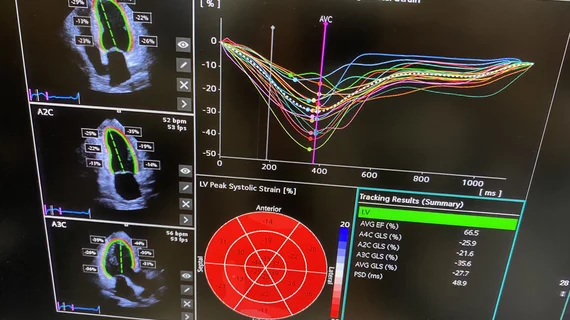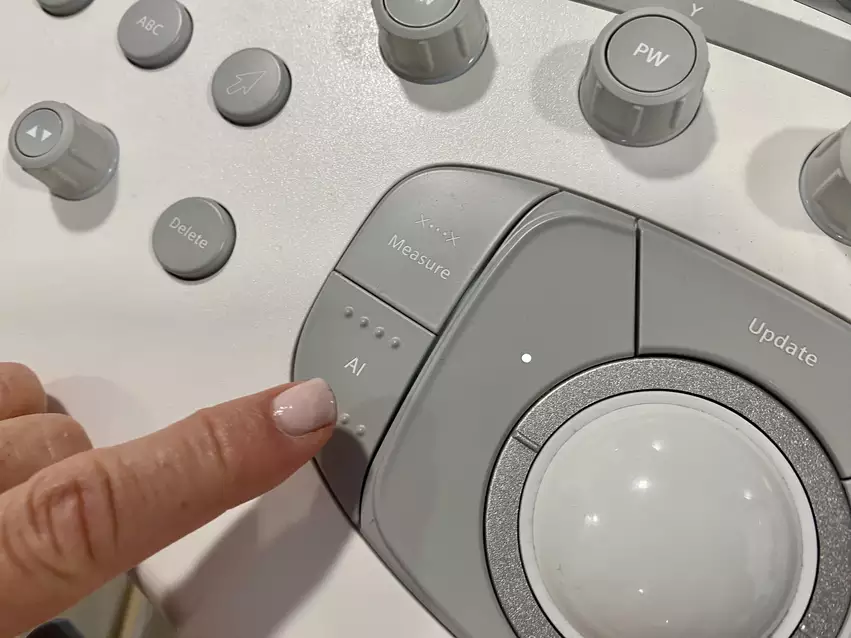Siemens Healthineers unveils 'truly revolutionary' AI-enabled echo system
Siemens Healthineers has unveiled Acuson Origin, a new cardiovascular ultrasound system with robust artificial intelligence (AI) capabilities that allow it to identify the anatomy being imaged and anticipate the next steps needed to advance patient care. The new system includes AI algorithms to automate approximately 500 different measurements.
The system was unveiled Friday, Aug. 25, at ESC Congress 2023, the annual meeting of the European Society of Cardiology (ESC).
“This is truly revolutionary. Most of the time with a technology advancement, you can’t say that because it is just a new feature on an old system, but this is a completely new creature. For the first time, the machine knows what it is looking at, so it knows what the next three steps are to help you do them,” explained Robert Burke, MD, director of noninvasive cardiovascular diagnostic imaging for HonorHealth in Phoenix.
Burke has tested the Origin system to evaluate and follow up with patients undergoing heart valve and left atrial appendage occlusion (LAAO) procedures. He also tested the system using transesophageal echo (TEE) during transcatheter aortic valve replacement (TAVR) procedures.
According to Burke, the system's AI detects and understands the anatomy in real time. He said this prevents the need for a sonographer or echocardiographer to search for the AI measurement tools in submenus, which can waste valuable time. Burke said a single AI button on the system can perform hundreds of measurements with the AI just looking at the current image on screen.
The vendor said this is the replacement for the SC2000, its long-time premium echocardiography system. While the company has offered various AI algorithms on the SC2000 over the past decade, these required humans to tell the machine what algorithms to use on each image to automate quantification. The company said the Acuson Origin has AI that detects all the cardiac anatomy immediately after the transducer is placed on the patient, and it knows what the next steps in exams are based on what it is looking at when the AI button on the console is pressed.
Siemens Healthineers said the Acuson Origin will addresses the entire continuum of cardiovascular patient care, including diagnostic, structural heart, electrophysiological, and pediatric procedures.
The number and complexity of cardiovascular disease patients is growing rapidly worldwide. At the same time, patient volumes are increasing while there is a growing shortage of cardiologists and sonographers. The demand for structural heart cases is also expected to increase rapidly with new transcatheter tricuspid and mitral valve devices being introduced.
To address the rising demands, Siemens Healthineers said the AI-enabled Acuson Origin can help greatly speed workflows, while at the same time greatly improving accuracy and eliminating variability and issues with reproducibility in measurements between operators.
Siemens said the Origin is designed to minimize the cognitive and ergonomic workload of cardiac exams and procedures, potentially allowing for greater consistency and efficiency for the user.
“Siemens Healthineers is committed to shaping the future of ultrasound imaging by empowering healthcare professionals with the latest cutting-edge tools,” Ajay Gannerkote, president of ultrasound for Siemens Healthineers said in a statement. “The Acuson Origin is the latest example of that steadfast commitment, with its vast array of new AI features and its potential to enhance diagnostic accuracy, elevate patient care and revolutionize the way we approach cardiovascular imaging.”
The Acuson Origin’s AI features have been trained on what Siemens says is the the world’s largest cardiac image database of more than 80 million cardiac ultrasound exams.
The Siemens Acuson Origin features an AI button on the console. When pressed, the artificial intelligence looks at the image on screen and knows the anatomy and the view, as well as the next steps to process the image and will automatically perform contouring and measurements for the user to assess.
The system delivers automated contouring and quantification of all four cardiac chambers without the need for an ECG via the 2D and 4D HeartAI features. The 2D HeartAI opens up auto tracking on contrast images, distinguishing the Acuson Origin as the only commercially available system with this capability.
4D HeartAI is a dual modality advancement for 4D auto contouring of all four chambers in 4D transthoracic echo (TTE) and both ventricles in 4D TEE, averaging up to 5 beats with or without ECG.
Additionally, Siemens said the system is the first in the industry to provide real-time cardiac view recognition. AI Assist, a new AI-driven feature specific to TEEs, recognizes cardiac structures the moment the transducer makes contact with the chest wall.
The system was also designed to be lightweight and easy to maneuver, with an ergonomic that requires less repetitive motion than other ultrasound systems. In addition, the most frequently used controls are positioned closest to the user’s hands.
“Some of the exciting things the system can do are strain in the 3D volume and with contrast, which historically we have not been able to do,” Burke explained. “The AI Doppler is also incredibly fast and accurate.”
He said the Acuson Origin has helped him with TEE during structural heart procedures. The AI automatically defaults to a multiplaner reconstruction view and Burke said it easily tracks the catheters without the need to look at different screens.
The Acuson Origin is pending both European CE mark and U.S. FDA clearance.


